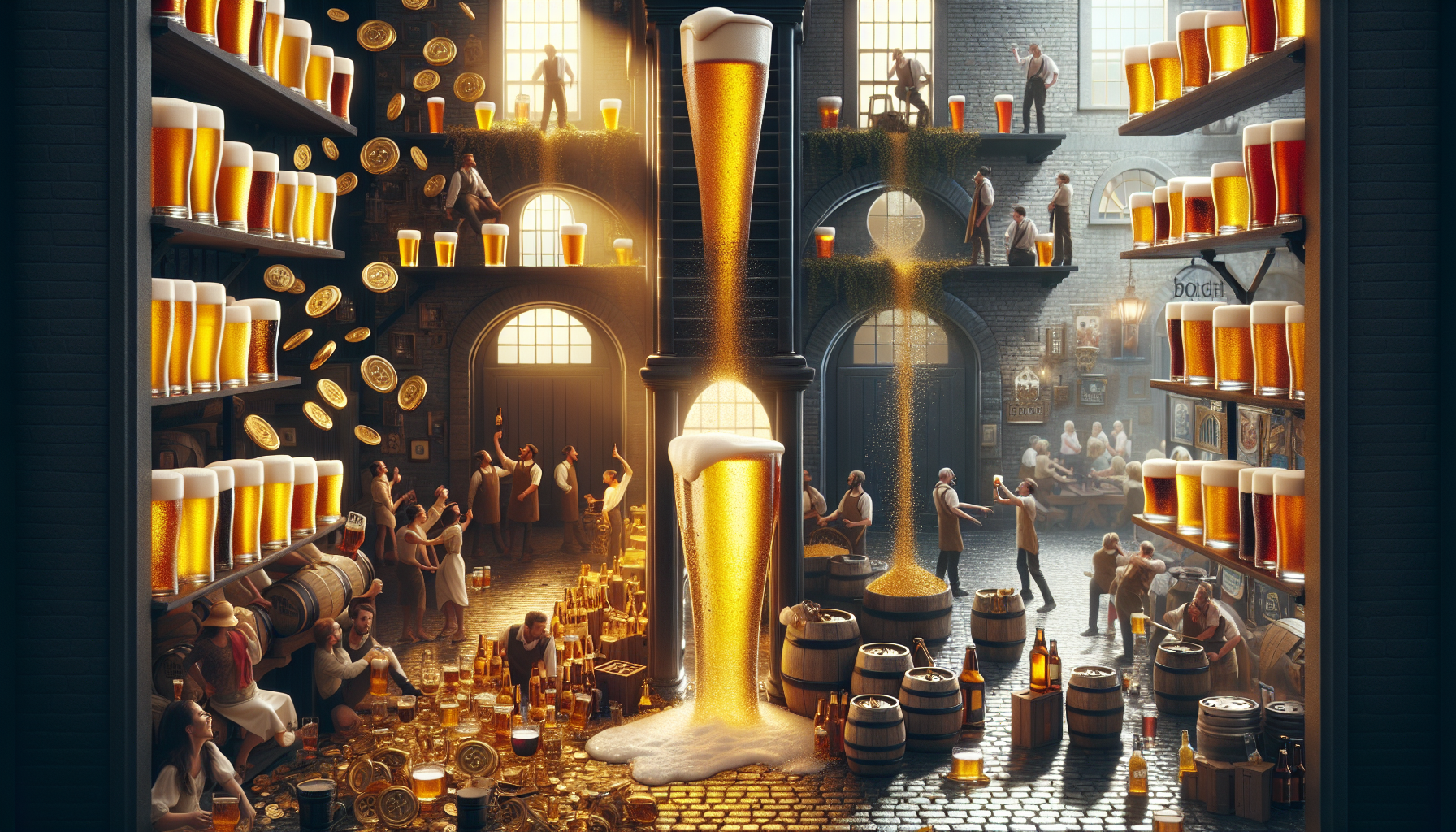The Growth of the Beer Industry
The Growth of the Beer Industry
Beer has been one of the oldest and most widely consumed alcoholic drinks in the world. Over the years, the beer industry has experienced significant growth, with more and more people embracing the art of brewing and exploring different beer varieties. This article explores the factors contributing to the growth of the beer industry and the emerging trends that have shaped its expansion.
Craft Brewing: A Driving Force
One of the major contributors to the growth of the beer industry is the rise of craft brewing. Craft beer is known for its unique flavors, quality ingredients, and the passion of artisanal brewers. These small-scale breweries have gained popularity among beer enthusiasts who appreciate the art and science behind the brewing process.
Craft breweries offer a wide range of beer styles, catering to various palates and preferences. From hop-forward India Pale Ales (IPAs) to flavorful stouts and refreshing wheat beers, craft breweries have something for everyone. The craft beer movement has enabled beer lovers to explore new flavors and enjoy a more diverse drinking experience.
Changing Consumer Preferences
Another important factor contributing to the growth of the beer industry is the changing preferences of consumers. In recent years, there has been a shift towards quality over quantity. Consumers are becoming more knowledgeable about beer and are seeking out unique and premium options.
Much like the farm-to-table movement in the food industry, consumers are now interested in the farm-to-glass concept when it comes to beer. They are looking for locally sourced ingredients, sustainable brewing practices, and transparency from breweries. This has led to the rise of “beer tourism,” where consumers visit breweries to learn about the brewing process and taste beers directly from the source.
The Influence of Technology
In today’s digital age, technology has played a significant role in the growth of the beer industry. Online platforms and apps have made it easier for consumers to discover new beers, track their favorites, and even order beer for home delivery. Social media has also allowed breweries to reach a wider audience and engage with beer enthusiasts on a global scale.
Brewing technology has also advanced, allowing brewers to experiment with different ingredients, flavors, and brewing techniques. This has led to the development of innovative beer styles and the creation of unique taste experiences. The use of advanced equipment and automated processes has also enabled breweries to increase production capacity and meet the growing demand.
Global Market Expansion
The growth of the beer industry is not limited to a specific region or country. Beer consumption has become a global phenomenon, with emerging markets in Asia, Latin America, and Africa experiencing a surge in demand. As the middle class expands and disposable incomes rise in these regions, consumers are looking for new and exciting beverage options.
Large brewery conglomerates have recognized the potential in these markets and have invested in local production facilities to cater to the growing demand. This has led to an influx of international and craft beer options in previously untapped markets.
In conclusion, the growth of the beer industry can be attributed to several factors, including the rise of craft brewing, changing consumer preferences, the influence of technology, and the expansion of the global market. With these trends in play, it’s an exciting time for both brewers and beer enthusiasts as the industry continues to evolve and offer new and unique experiences.
Emerging Trends in the Beer Business

Craft Beer Revolution
In recent years, the beer industry has witnessed a revolution with the rise of craft beer. Craft breweries have been popping up all over the world, offering unique and flavorful beers that cater to the evolving tastes of beer enthusiasts. Craft beer is characterized by its focus on quality, creativity, and innovation. This trend has gained popularity among consumers who are seeking fresh and distinctive flavors, and are willing to experiment with new styles and brews. Craft breweries are often small-scale, independent businesses that prioritize local sourcing and sustainable practices.
Health-Conscious Choices
Another emerging trend in the beer business is the increasing demand for healthier beer options. As people become more conscious of their health and wellness, they are looking for beer options that align with their lifestyle choices. This has led to the emergence of low-alcohol and low-calorie beers in the market. These beers offer a lighter drinking experience, without compromising on taste. Breweries are also experimenting with ingredients like fruits, herbs, and spices to create beers that are not only delicious, but also offer added health benefits.
Sustainability and Environmental Consciousness
The beer industry is also taking significant steps towards sustainability and environmental consciousness. Breweries are focusing on reducing their carbon footprint by implementing energy-efficient brewing processes and using renewable energy sources. Additionally, many breweries are adopting practices such as water conservation, waste reduction, and recycling. Some breweries are even using spent grains as feed for livestock or repurposing them for biogas production. Consumers are increasingly seeking out breweries that prioritize environmental sustainability, making it an important factor in their purchasing decisions.
Online Beer Culture
The rise of social media and e-commerce has transformed the way consumers interact with beer brands. Online platforms have provided beer enthusiasts with a space to connect, share their experiences, and discover new breweries and beers. This has created a thriving online beer culture, where consumers can access information about beer styles, brewing techniques, and industry news. Breweries are taking advantage of these platforms to engage with their customers, promote their beers, and even sell directly to consumers. Online beer festivals and virtual tasting events have also become popular, allowing consumers to explore a wide variety of beers from the comfort of their homes.
International Collaborations
Collaborations between breweries from different countries have become a prominent trend in the beer business. These collaborations bring together the expertise, creativity, and unique flavors of different breweries, resulting in exciting and innovative beers. This trend has not only allowed breweries to expand their market reach but has also helped in fostering cultural exchange and appreciation for different beer traditions. Collaborations often lead to limited-edition or one-time-only releases, creating a sense of exclusivity and excitement among beer enthusiasts.
In conclusion, the beer business is experiencing several emerging trends that are shaping the industry. Craft beer, health-conscious choices, sustainability, online beer culture, and international collaborations are just a few examples of how the beer industry is evolving. These trends reflect the changing preferences and values of consumers, who are seeking quality, variety, and experiences that go beyond traditional beer offerings. As the beer business continues to evolve, it offers exciting opportunities for breweries to innovate, connect with consumers, and create memorable beer experiences.
Challenges and Opportunities in the Beer Market

The beer market is a dynamic and ever-evolving industry that presents both challenges and opportunities for brewers and enthusiasts alike. With a growing craft beer movement and a rise in consumer demand for unique and high-quality brews, the beer market has experienced significant changes in recent years. In this article, we will explore some of the challenges faced by beer producers and the opportunities that arise from these challenges.
1. Increasing Competition
One of the major challenges in the beer market is the intense competition among brewers. The industry is saturated with a wide range of breweries, both large and small, offering a variety of beer styles to cater to diverse consumer preferences. This competition pushes brewers to constantly innovate and differentiate themselves from their competitors to capture a larger share of the market.
2. Changing Consumer Preferences
Another challenge in the beer market is the shifting consumer preferences. Modern beer drinkers are increasingly looking for unique and flavorful beers, experimenting with different styles, and seeking out craft breweries that offer quality and variety. Brewers must constantly adapt to these changing preferences and develop new and exciting beer recipes to meet consumer demands.
3. Regulatory Hurdles
Regulatory hurdles and compliance issues pose significant challenges for brewers. These regulations vary from country to country and can impact the production, distribution, and marketing of beer. Brewers need to navigate through complex legal frameworks, obtain licenses and permits, and ensure compliance with labeling and packaging requirements. Adhering to these regulations while maintaining profitability can be a daunting task for breweries, especially smaller craft operations.
4. Distribution and Logistics
The distribution and logistics of beer present challenges, particularly for small-scale craft breweries. Delivering beer to various locations, ensuring its freshness, and maintaining the cold chain can be costly and complicated. Moreover, with the increasing popularity of online sales and direct-to-consumer models, breweries must adapt their distribution strategies to meet the evolving demands of the market.
5. Sustainability and Environmental Impact
Crafting beer involves significant water, energy, and raw material consumption, resulting in a considerable environmental footprint. With growing concerns about climate change and sustainability, breweries face increasing pressure to adopt eco-friendly practices and reduce their environmental impact. This presents an opportunity for breweries to differentiate themselves and attract environmentally conscious consumers by implementing sustainable brewing practices and using locally sourced ingredients.
Opportunities in the Beer Market
1. Craft Beer Movement
The craft beer movement has revolutionized the beer market, creating immense opportunities for small and independent breweries. Craft beer enthusiasts seek out unique and artisanal brews, often willing to pay a premium for high-quality and locally produced beers. As a result, craft breweries have seen significant growth, with consumers embracing the wide range of styles and flavors they offer.
2. International Expansion
The beer market continues to expand globally, presenting opportunities for breweries to enter new markets and reach a broader customer base. With the growing popularity of craft beer, breweries can export their products and tap into the demand for unique and exotic beer styles in different countries. International expansion allows breweries to showcase their craftsmanship and create a global presence.
3. Collaborations and Partnerships
Collaborations and partnerships between breweries present exciting opportunities for innovation and growth. By teaming up with other breweries or non-beer-related businesses, brewers can combine their expertise and resources to create limited-edition or special release beers that generate buzz and attract new consumers. These collaborations can tap into new markets and expand the reach of both brands involved.
4. Beer Tourism
Beer tourism has become a popular trend, offering breweries an opportunity to attract visitors to their facilities. Breweries can create unique and immersive experiences by offering brewery tours, tastings, and special events. This not only provides an additional revenue stream but also helps brewery brands connect with consumers on a deeper level, fostering loyalty and word-of-mouth marketing.
While the beer market poses several challenges, it also provides numerous opportunities for breweries to thrive and grow. By embracing innovation, staying attuned to consumer preferences, and adopting sustainable practices, brewers can overcome these challenges and establish a successful presence in the ever-evolving beer industry. By capitalizing on the opportunities available, both new and established breweries can carve out their niche and delight beer enthusiasts around the world.





Leave a Reply